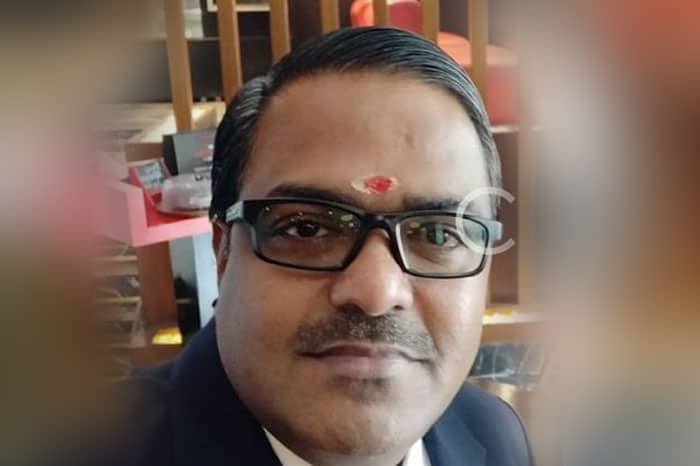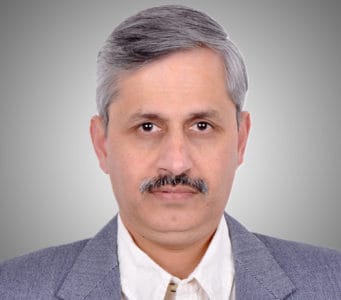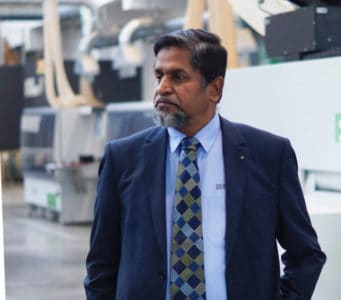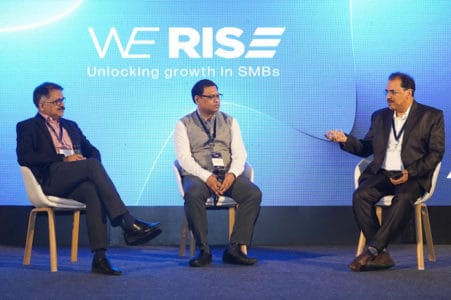Talking to Hariharan S. Ramamoorthy, National VP of Laghu Udyog Bharati
-Sri Ram A.N. | IMAWS
MSMEs contribute almost 8% of the country’s GDP and are responsible for 50% of the country’s total exports. They are also accountable for one-third of India’s manufacturing output. MSMEs employ more than 11 crore people, aiming to grow this number to 15 crores in the coming years. Also, MSMEs play important roles in economic and social development, contributing to value-added activities, innovation and inclusive growth through creating job opportunities and their widespread presence in both urban and rural areas.
Registering any business as an MSME will allow them to be eligible for government grants and funding programs and also be eligible for loans from private banks. An organization with PAN India presence with a mission on the Nation’s growth through the development of micro & small entrepreneurs, every hand they extend will always be supportive of the MSME sector.
A conversation with Hariharan S. Ramamoorthy, National Vice President, Laghu Udyog Bharati makes one clear – MSMEs have a great role to play in India & also, and there is a vast space available to make it happen. Experts from his interview:-
Q1. Can you share about Laghu Udyog Bharati (LUB)?
Ans. Laghu Udyog Bharati is an All India Organization servicing the Micro & Small industry. We have representations across almost all States of our country, from Kashmir to Kanyakumari. We have represented almost 600+ districts of the country and close to about 40,000 members. Each member is an MSME unit.
One of LUB’s objectives is to address the Micro & Small Industries issues. One of the USPs of LUB is that we have representations across almost all the Ministries of our country. For example, in the Ministry of Finance, Ministry of MSME, Ministry of Labour, and Ministry of ESI & PF, which means any issue addressing the Micro & Small Industry, we have easy access to the ministry where one of our members is already there, and we have been able to take up the issues concerning the members directly to the Government. The issues reach the Government at the right time and place, and we have been able to escalate the issues to the right person.
What are your admirable contributions to the MSME Sector – for the growth of our country?
We are continuously working on addressing various issues. We are also restructuring the New norms for the Micro, Small & Medium Sectors. We had vehemently opposed the medium sector of up to 250 crores as that doesn’t give a level playing field to the MSME sector. Nevertheless, we had given a lot of representations that the medium sector of up to 250 crores should not be included as an MSME sector. In terms of contributions to the sector, since we are widely available all over the country, we have many interdependent businesses amongst our members. We have a very big portal, and members can upload their products and get business.
Secondly, in terms of addressing all the key issues during the Covid Pandemic, many members suffered in terms of financial availability and issues with the bank. LUB pitched in many of these cases and got the loans sanctioned for many of our members during the pandemic.
The other major contribution was during ECLGS 2.0, where we met with our Hon. Finance Minister Smt. Nirmala Seethaaraman. There were supposed to be emergency loans & automatic loans. The automatic process was not happening at the banks since it had a clause that it would be at the bank managers’ discretion to sanction the loan. If this is going to be an emergency loan & it’s going to be in the hands of the bank manager for the sanction, then it isn’t really tantamount to being an emergency loan. Obviously, the manager will say many ifs and buts, and it will be difficult to get the loans sanctioned. We took this issue very strongly with our Finance Minister on 21st September 2021, and within 15 days, that particular clause was taken out. All the MSME members across the country could get automatically loan sanctioned for the second phase. This is during Covid 2.0.
Not only this, we have continuous discussions with Honourable ministers, and most of the issues concerning MSMEs in the country don’t go without logical discussion with the Laghu Udyog Bharati representatives.
Q2. Can you share about your events & conclaves?
Ans. We want to function across more regions across the country North, West, East & South. We want to consolidate the members across the south, where the issues concerning the south will differ slightly from those in the other regions. We want to take the MSMEs to the next level as we are confident that our country is going in a good direction, whereas the next 10 to 20 years will be a very big growth for India. So, the growth of Bharath cannot happen without the contribution of the MSME sector. We want the MSMEs to change, understand, transform and grow. We want to address digital transformation, supply chain issues, leadership management, change management & succession planning. More than 1,000+ MSME members participated, and it was a huge success for us.
Q3. What are the major challenges for MSMEs today & the way how to overcome them?
Ans. Although the Government speaks about MSMEs are the backbone of our economy, one of the biggest challenges today for the MSME sector is strategizing them in terms of turnover & investment. 99% of the MSMEs are under less than 40 lakhs turnover with an investment of fewer than 10 lacs. These are the micro units which are really struggling today. When it comes to that kind of sector, what happens is the easy accessibility of finance is a big trap.
What we are batting with the ministry is that “for this particular segment of people, there should be complete insulation from the norms and also from the interest rate variations which are happening from time to time. They should be matched in terms of agricultural credit, which is about 6% and also they should have the benefit of GST even though they have some trouble.
They can be given a credit card which can be used only for the payment of GST, as today an MSME runs from pillar to post only to make the payment to the Government rather than taking his profits home. So, they are provided with an interest-free 90 days credit card, where the credit limit should be based on their past performance. In that case, it should be an automatic renewal, and the credit limits should be used only to make payments to the Government.
In that way, the Government also ensures that there are no NPAs, and the MSMEs can also run their business and focus on their technology for their process and their business. If these two things are done, it will create a very big chain in the country’s entire scenario, especially in Micro and Small Industries.
Q4. Post-COVID, how is the transformation happening in the business?
Ans. People are coming back into the business in a much stronger way. Laghu Udyog Bharati has conducted in Tamilnadu more than 120 to 130 zone seminars where we have given them a lot of inputs for the members to take a step back and look at their business and how to take it to the next level, how to be more prepared to handle the eventualities, and how to change their mindset towards growth completely. That has given the members a lot of confidence, and they can come back very strongly now. A lot of investments are happening in the MSME sector, a lot of value is being created, and all see very big growth potential where overall, our country is doing a GDP of 7 to 8%. Compared with other European and North American countries not doing so well, India is poised for very big growth.
One big challenge for India is whether we will be able to take up the overtunes overflowing out of China. A lot of countries are now trying to leave China. So, our MSMEs are prepared to take up this volume, and we think this is where our Government should play a key role here, where we need to strengthen the MSMEs. Today, MSMEs in India, when compared with MSMEs in China or other countries, are not at the same level. We need to upgrade these MSME sectors to a bigger level so that they will be more willing to take up risks and challenges.
One more thing is that “the Government should work out some kind of an industrial estate where they should be provided land and power availability at much cheaper cost. This is also something that is bothering the MSMEs to grow. Today all the industrial estates in big cities like Chennai, Bangalore etc., the cost of real estate has gone up so high, and the MSMEs are not even able to expand their business. They need to go outside 30 to 50 kms and are not able to focus on their business. All these SIDCO & SIPCOT estates should play a level playing field with a uniform rate; why should a real estate property of an industrial estate keep going? It doesn’t make sense at all.
Q5. Where is the MSME sector going in future?
Ans. In LUB, we are trying to focus on developing manufacturing capability. We don’t want India as a country to go more towards service. That’s why, in our association, almost all the members are purely manufacturers. There is a very big opportunity available for the MSME sector today, especially in the way in which the country is getting completely digitally transformed. The Government is also developing a new platform like Digital Commerce, which will take the MSMEs to a very high level. MSMEs making products can understand the concept of ONGC (Open Nett Digital Commerce) – a very big platform opened by the Government where in this open network, there is going to be a complete increase the profitability.
Beyond this point, we also advise MSME members not to depend purely on government schemes. For a company which is up to 5 or 10 years old, it is ok. But, if more than ten years they should be able to develop & improve upon their company within. Internal strength and technology upgradation should be the focus rather than depending on the Government. Basically, we advise our members to stand on their own legs & try to improve the company’s overall development. With the overall geopolitical situation happening across the Nation, India is poised to get many of these businesses from outside & with the MSMEs are willing to take up the risk and challenge – the future for the next 20 – 30 years is going to be bright.
Q6. What is your advice to the newcomers?
Ans. The first and foremost thing is that they should be financially literate enough. They should have financial acumen. Also, they should be financially prudent enough to handle the business. If that prudency is developed, they can be successful.
For Startups – one of the most important things is they should probably dwell on new technologies, how digitally they will handle their company, and how they will bring in new innovations from abroad. At the same time, they should not miss the conventional business also.
Prime Minister of India’s trademark campaign “Make in India” has been simplified. Laghu Udyog Bharati serves as a foundation for making this ambition a reality. Furthermore, they play a vital role in the lives of ordinary people and the country’s economic growth. In recent years, many youths have been inclined towards entrepreneurship; we are sure the day is still young.













